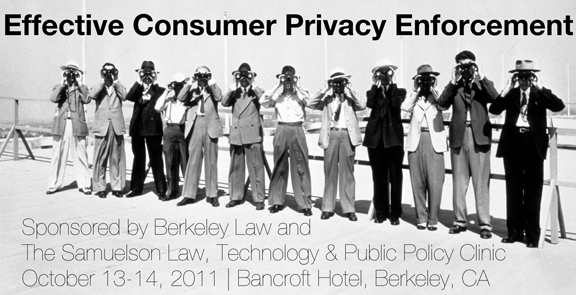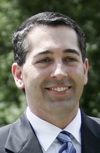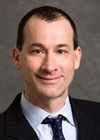
Speaker Bios:

Leslie A. Bailey is a Staff Attorney at Public Justice, where her practice focuses on consumers’ rights, including fighting abusive mandatory arbitration clauses and federal preemption defenses; civil rights; and challenges to unnecessary court secrecy. She recently argued FIA Card Services v. Weaver, — So.3d —-, 2011 WL 880294 (La. Mar. 15, 2011), in which the Louisiana Supreme Court held that a debt collector cannot enforce an arbitration award against a consumer who never agreed to arbitration; and Toe v. Cooper Tire, where she represents the Center for Auto Safety. Leslie is proud to have been a member of the trial team in Hankin v. City of Seattle, a class action in federal court on behalf of nearly 200 people arrested in downtown Seattle in 1999 while protesting against the WTO. The trial resulted in a jury verdict that the city had violated the protesters’ Fourth Amendment rights, and the case settled for $1 million and significant injunctive relief.

After graduating from Harvard University in 1991 with honors, Dan Balsam worked in advertising and direct marketing in New York and Boston. Dan then earned a MBA with honors from the Anderson School at UCLA in 1998, after which he began working in online marketing. It was Dan’s experience as a marketer that gave rise to his loathing of spam. Two small claims suits in 2002 began a hobby that turned into a career change, leading to a JD from UC Hastings in 2008. Dan has filed dozens of anti-spam actions in superior court, won 50 small claims trials, and settled dozens of disputes. Balsam v. Trancos, currently on appeal, was the first case other than small claims to actually go to trial for violations of Business & Professions Code 17529.5. Dan’s anti-spam actions have generated international publicity in print, radio, and TV, and Dan was featured in the June 2011 issue of California Lawyer Magazine. Outside of the spam arena, Dan practices general civil litigation, including breach of contract actions, and several years ago caused the Department of Motor Vehicles to reverse a policy that discriminated against disabled drivers and did not track the Vehicle Code.

Kevin Bankston, a senior staff attorney specializing in free speech and privacy law, was the Electronic Frontier Foundation’s Equal Justice Works/Bruce J. Ennis Fellow for 2003-05. His fellowship project focused on the impact of post-9/11 anti-terrorism laws and surveillance initiatives on online privacy and free expression. Before joining EFF, Kevin was the Justice William J. Brennan First Amendment Fellow for the American Civil Liberties Union in New York City. At the ACLU, Kevin litigated Internet-related free speech cases, including First Amendment challenges to both the Digital Millennium Copyright Act (Edelman v. N2H2, Inc.) and a federal statute regulating Internet speech in public libraries (American Library Association v. U.S.). Kevin received his J.D. in 2001 from the University of Southern California Law Center, and received his undergraduate degree from the University of Texas in Austin.

Meghan Bohn is Staff Attorney for the Privacy Rights Clearinghouse, and joined the organization in March, 2011. She focuses primarily on electronic privacy issues, and worked previously as a legal fellow with PRC’s sister organization, New Media Rights, in the area of intellectual property. Meghan researches and writes educational materials; prepares comments for privacy-related regulatory proceedings; represents the PRC in workshops, hearings, and conferences; and monitors privacy law developments. She received her JD from the University of San Diego School of Law, and holds a BA in Journalism and French from the University of Georgia.

Brian Carver is an Assistant Professor at the University of California, Berkeley’s I School. His primary research interest is in the laws and policies governing technology and information, particularly in understanding the technical, economic, social, and legal frameworks that best promote progress and access to information. Specifically, he is interested in collaborative forms of creativity enabled or enhanced through computer networks and the ways in which law or other factors facilitate or frustrate creativity and innovation.
Prior to teaching at Berkeley, Professor Carver was an attorney in private practice. His background includes a B.A. and M.A. in philosophy, and he is a fan of Ludwig Wittgenstein.

Beth Givens is founder and director of the Privacy Rights Clearinghouse, established in 1992. She has developed the Fact Sheet series as author and/or editor. She authored the encyclopedia entries on identity theft for Encyclopedia of Privacy (2007), World Book Encyclopedia (2004) and Encyclopedia of Crime and Punishment (2002). She is author of The Privacy Rights Handbook: How to Take Control of Your Personal Information (Avon, 1997) and is co-author of Privacy Piracy: A Guide to Protecting Yourself from Identity Theft (1999). She contributed a chapter on consumer and privacy rights to the 2006 book, RFID: Applications, Security and Privacy. Givens represents the interests of consumers in public policy proceedings at the state and federal levels (California Legislature, U.S. Congress, and federal and state regulatory agencies). Her contributions to legislative hearings, regulatory workshops, and public policy conferences are found in the Speeches & Testimony section of the web site.

James K. Green is a lawyer based in West Palm Beach focusing on complex federal and civil litigation, land use, constitutional law, civil & human rights, and class actions. Green has been practicing law for more than 33 years, and is admitted to practice before the United States Supreme Court, and all state and federal courts in Florida and the District of Columbia. He has argued several major civil rights cases throughout his career, and has been a leader in the American Civil Liberties Union of Florida, serving as its Legal Director from 1987-1992 and its President from 1993-1996. He is a graduate of the University of Pennsylvania and the Antioch College School of Law.

Since 1981, Evan Hendricks has been Editor/Publisher and founder of Privacy Times, a newsletter based in the Washington, D.C. area. Through the newsletter alone, he has published nearly 3,000 pages covering a wide range of privacy and information law subjects, including the Fair Credit Reporting Act, Privacy Act, Freedom of Information Act, Gramm-Leach Blilely, and the USA Patriot Act. Mr. Hendricks regularly testifies before Congress, with eight appearances between 2003-2006. He is a regular presenter at Federal Trade Commission workshops. He has been qualified by the courts as an expert witness in FCRA and identity theft cases. Mr. Hendricks has served as a consultant on privacy issues to Federal and State governmental organizations, and businesses. He has been a featured American presenter at events in Paris, France, Venice, Italy, Cardiff Wales, London, England and Ottawa, Ontario.

Chris Jay Hoofnagle is director of the Berkeley Center for Law & Technology’s information privacy programs and senior fellow to the Samuelson Law, Technology & Public Policy Clinic. He is an expert in information privacy law. Hoofnagle’s recent work focuses on promoting competition among financial institutions to prevent identity theft. In Identity Theft: Making the Unknown Knowns Known, he discusses the problem of “synthetic identity theft,” a form of crime where an impostor fabricates personal information and yet still can obtain credit accounts. Hoofnagle argues that the rise of this form of fraud demonstrates a fundamental failure in banks’ anti-fraud gatekeeper function, and proposes market reforms for reducing identity theft. With Jennifer King, Hoofnagle has started a consumer privacy survey research project. This project explores consumers’ understanding of privacy and tests notions of consumer autonomy underlying existing self-regulatory privacy rules. Hoofnagle co-chairs the annual Privacy Law Scholars Conference. He is licensed to practice in California and Washington, DC.

Joanne McNabb has been Chief of the California Office of Privacy Protection since it opened in 2001. The first-in-the-nation Office is a resource and advocate on privacy issues. In addition to providing information and education for consumers, the Office also publishes privacy practice recommendations for business and other organizations. McNabb is a Certified Information Privacy Professional, with specializations in Government and Information Technology. She serves on the Privacy Advisory Committee to the U.S. Department of Homeland Security, and is a Fellow of the Ponemon Institute, a research center on privacy, data protection and information security policy. Before starting the Office of Privacy Protection, McNabb had over 20 years experience in public affairs and marketing, in both the public and private sectors, including five years with an international marketing company in France.

Ted Mermin, J.D., M.Ed., is the co-founder and Executive Director of Public Good. For the past decade, he has litigated consumer protection, First Amendment, and civil rights law cases at the trial and appellate levels, and has written and spoken extensively on issues of preemption, privacy, free speech, and unfair competition. Prior to founding Public Good, Ted served for eight years as a Deputy Attorney General in the California Department of Justice, where he brought consumer cases against abusive loan companies, rental car outfits and telecom providers. He handled the first case to rein in the practices of a predatory lender with more than 3000 outlets nationwide, and wrote a law that led the way to successful prosecutions of “immigration consultants” who routinely took thousands of dollars from those seeking asylum in the United States and provided nothing in return. Ted also authored a wide variety of amicus briefs on behalf of the California Attorney General (and often the AGs of many other states) in appellate courts around the nation in cases addressing deceptive advertising, tobacco promotion and digital marketing.

Deirdre K. Mulligan is a professor of law at the UC Berkeley School of Information and a Faculty Director of the Berkeley Center for Law and Technology. She was the founding director of the Samuelson Clinic, which she led from 2001-2008. Before coming to Boalt, she was staff counsel at the Center for Democracy & Technology in Washington. Professor Mulligan’s current research agenda focuses on information privacy and security. Current projects include qualitative interviews to understand the institutionalization and management of privacy within corporate America, and role of law in corporate information security policy and practice. Other areas of current research include digital rights management technology and privacy and security issues in sensor networks and visual surveillance systems, and alternative legal strategies to advance network security.

Monique Olivier has spent the majority of her career fighting for the rights of individuals. She combines a passion for equality and fairness with a strategic and innovative approach to litigation. Monique represents individuals and classes in employment, consumer protection, immigration and civil rights matters at the trial and appellate levels throughout California. She has successfully tried and settled cases involving gender discrimination, wage disputes, disability access, predatory lending, and fraud and misrepresentation against private and public entities. Prior to joining DPLO, Monique was the Managing Attorney at The Sturdevant Law Firm in San Francisco. Her notable cases included the settlement of a national class of over 40,000 individuals who had their tax refunds seized to pay third-party debts, and comprehensive relief for women students seeking equal educational opportunities in athletics. Monique has also briefed, argued and won several cases that have led to reported decisions for consumers and victims of discrimination in the California Supreme Court, the California Courts of Appeal, and the United States Court of Appeals. Monique has been certified as an Appellate Specialist by the California State Bar.

Chris Ridder is a lawyer, currently in private practice, as well as a non-residential fellow at Stanford Law School’s Center for Internet and Society (CIS). He does intellectual property litigation and counseling in the areas of copyright, trademark, free speech and rights of publicity, and general commercial litigation. His academic research interests include the full range of issues that arise at the intersection of technology and the law, including the application of intellectual property law to software and the Internet, and the impact of technological change on privacy and civil liberties. He has presented work at a number of conferences, including Where 2.0 2005 on location privacy, Black Hat 2007, on security weaknesses in computer forensic software, the Global Center for ICT in Parliament, on Internet filtering, the 2008 IP Scholars Conference, on copyright licensing, and the Third World Congress on Public Law, on copyright limitations.

Rosemary M. Rivas is the managing partner of Finkelstein Thompson LLP’s San Francisco office. She represents plaintiffs in consumer and antitrust class action litigation in both state and federal courts. Ms. Rivas and her firm have represented consumers in a number of privacy suits, including Ruiz v. Gap, Gardner v. Health Net, Inc., and In re Countrywide Financial Corp. Customer Data Breach Security Litigation. While a number of courts around the country have ruled that consumers affected by a data breach lack Article III standing, in Ruiz v. Gap, the Ninth Circuit affirmed a decision by the Northern District of California holding that a consumer has Article III standing to pursue claims arising from a stolen laptop containing personally identifiable information. From 2009-2011, Law & Politics Magazine has selected Ms. Rivas as a Rising Star. Ms. Rivas received her law degree from the University of California, Hastings College of the law. She received her undergraduate degree from San Francisco State University.

Paul Schwartz is a leading international expert on information privacy and information law. His scholarship focuses on how the law has sought to regulate and otherwise shape information technology – as well as the impact of information technology on law and democracy. Schwartz joined the faculty in 2006 after teaching at Brooklyn Law School and the University of Arkansas-Fayetteville for eight years. He teaches privacy law. Schwartz has advised numerous U.S. and European governmental bodies on privacy and other legal issues and served as an adviser to the Commission of the European Union. In 2002-03, he was a Berlin Prize Fellow at the American Academy in Berlin and a Transatlantic Fellow at the German Marshall Fund in Brussels. Schwartz has also received a Humboldt Scholar Grant, a Harry Frank Guggenheim Fellowship and a Fulbright Fellowship.

Christopher Soghoian is a Washington, DC based Open Society Fellow, supported by the Open Society Foundations. He is also a Graduate Fellow at the Center for Applied Cybersecurity Research, and a Ph.D. Candidate in the School of Informatics and Computing at Indiana University. His research is generally focused on the topic of online privacy. This includes both consumer issues (such as online tracking) as well as government surveillance. His Ph.D dissertation is focused on the role that companies play in either resisting or facilitating surveillance of their customers. He was the first ever in-house technologist at the Federal Trade Commission (FTC)’s Division of Privacy and Identity Protection. Prior to his year in government, he created a privacy enhancing browser add-on that was downloaded more than 700,000 times in its first year before he sold it to Abine, Inc.

Dave Stampley (CIPP), a partner at KamberLaw, has handled leading consumer privacy and security legal matters for over ten years, including recent KamberLaw cases involving “Flash cookies,” Facebook Beacon, and the Netflix Prize contest. Previously, as an Assistant Attorney General in New York, he led landmark multistate enforcement actions, including the DoubleClick and Ziff Davis Media cases. He was general counsel and privacy consultant for information security consultancy Neohapsis and served as director of privacy for Reynolds & Reynolds, a technology solutions provider. He is a graduate of the University of Virginia School of Law and a former IT professional.

Colette Vogele is a Senior Copyright Attorney at Microsoft Corporation and the President and co-founder of Without My Consent, a non-profit that empowers individuals harmed by online privacy violations to stand up for their rights. She is a frequent speaker and author on copyright, privacy, and internet content and liability. Her current research interests involve the intersection of privacy rights of individuals, on-line anonymity, free speech and IP. Vogele’s 2011 Stanford Center for Internet and Society fellow project involved development of Without My Consent which also received significant support from the Samuelson Clinic at Berkeley Law School. Prior to joining the Center, Vogele litigated copyright, trademark, anti-counterfeiting, trade secret misappropriation and high tech patent cases at Preston Gates and Ellis (now K&L Gates) in Los Angeles, and Weil Gotshal & Manges LLP in Silicon Valley.

For fifteen years, Timothy Walton has been committed to privacy law and property rights, pursuing egregious spammers and other online miscreants before Federal and California state courts and up to the United States Supreme Court. When the Internet was in its toddler years, he stepped forward to defend the early adopters from the scammers who sought to use this new forum for the least scrupulous business practices. Staying one step ahead of that barely-legal and always opportunistic community has become his life’s work. Timothy Walton has represented both advertisers and consumers in an effort to reduce the Internet burden of unsolicited advertising by email, fax and telephone since 1999. His focus is on helping his clients find and enjoy the most ethical, successful and profitable business practices for today’s Internet climate.